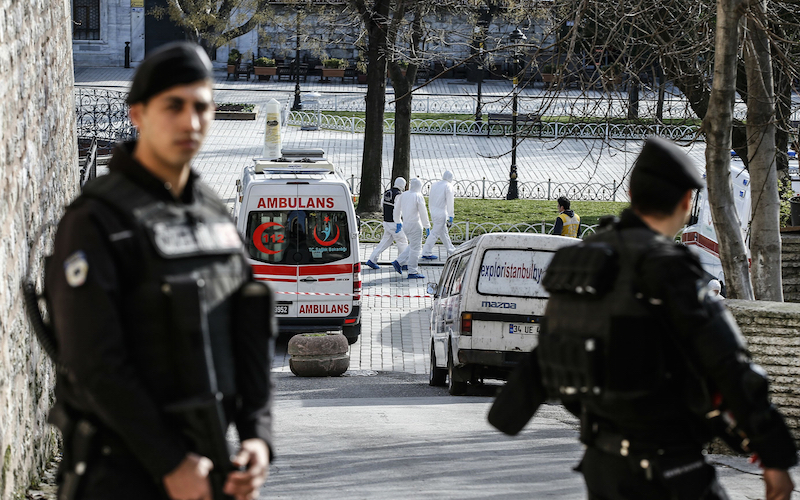
ISIS Bombing in Istanbul Strengthens U.S.-Turkish Relations
Yesterday’s suicide bombing by an ISIS affiliated Syrian refugee in Istanbul, Turkey has left nine German nationals dead and several others critically wounded. This is the first executed ISIS related terrorist attack in the New Year on Turkey. A potential prior terrorist attack was thwarted when Turkish police arrested two suspects with ties to ISIS on New Year’s Eve in a plot aimed at Turkey’s capital, Ankara. This NYE plot aimed at NATO-ally Turkey sparked a series of actions from the US to show support for the coalition against ISIS.
The united front Turkey and the US have showed in the battle against ISIS has made the terrorist organization concerned about the strength of the cooperation which has led to the targeting of Turkey’s fragile tourism industry. On January 6, 2016, Gen. Joseph Dunford Jr. met with President Erdogan in Ankara to discuss strategies regarding refugees, Russia, Iran, border control, and ISIS. The US and Turkey have an important bilateral relationship which Gen. Dunford commented on, “we have a broader, political economic relationship with Turkey, and we have security interest in common.” US and Turkish militaries have been collaborating in the fight against ISIS particularly in securing Turkey’s border with Syria. The closing of the volatile border has limited ISIS ability to filter both personnel and supplies into the region.
Just one day prior to Gen. Dunford’s visit to Ankara, US Special Presidential Envoy Brett McGurk praised Turkey’s efforts against ISIS and said that it has become “much harder” for foreign fighters to cross the Turkish-Syrian border.
In his daily briefing, McGurk remarked that “the Turks have taken significant steps in terms of setting up defensive perimeters and more patrols” in closing the 98-kilometer border with Syria.
The military cooperation between US-Turkey has crippled ISIS efforts and will continue to diminish the influence that the terrorist organization has on the region.
The collaboration between the US-Turkey has not solely been focused on military operations but also on domestic humanitarian issues. The first of the year started out strong for US-Turkish relations as US Senator Kristen Gillibrand visited President Erdogan at the historical Mabeyn Mansion in Yildiz Palace over the weekend. The reception that was headed by Senator Gillibrand and a delegation of US Senators as well as President Erdogan’s cabinet members met to discuss US-Turkish relations pertaining to ongoing regional matters that have required cooperation between the two allies in tackling the developments in both Syria and Iraq.
In the two-hour reception, the US delegation praised Turkey for its efforts in humanitarian assistance to the Syrian refugees as well as military efforts against the terrorist organizations PKK and Daesh. This is the first meeting of US Senators with President Erdogan this year to discuss regional issues that were the main focus of international affairs for much of 2015. Just this past week Ankara’s Ministry of European Affairs released its plan to offer Syrian refugees work permits allowing them to legally work in Turkey.
These domestic developments in Turkey show that ISIS cannot deter Turkey from providing humanitarian assistance to the millions of Syrian refugees residing in their country. The support from NATO allies on domestic developments regarding refugees is critical for improving the economic, political, and cultural aspects of Turkish society. Terrorist attacks carried out by Syrian refugees affiliated with ISIS will not hinder the improvements of the US-Turkish relations but will only make them stronger as the US stands by its NATO ally.
Last week’s, Insight Turkey conference hosted by SETA involved discussions on US-Turkish relations by many prominent officials including H.E. Mehmet Simsek and Former Congressman Robert Wexler. Congressman Wexler commented that “stability will be an underlying aspect of a US-Turkish strategic relationship” and that the cooperation between the US and Turkey will provide a strong front against the pivotal matters both nations are facing in the region. H.E. Mehmet Simsek also touched on the growing US-Turkish relationship by stating, “the way forward is to be more democratic” in Turkey and cooperation with the US on foreign policy.
The relationship between US and Turkey has been very multidimensional and multilayered particularly over the last several years. H.E. Mehmet Simsek was optimistic about the changes in Turkey regarding the educational system as well as economics that will benefit both nations “in the next 20-30 years, and particularly Turkey will reap the benefits of what we are doing today.” Bilateral trade between the two nations continues to increase yearly improving from $10 billion to $20 billion in the duration of just ten years.
In 2016, the world will see the continuing growth of a strong, united friendship between the US and Turkey. Turkey will have to continue its cooperation with President Obama on foreign policy and make a smooth transition to the new administration at the end of the year. The Obama administration will be much more active and determined to degrade and destroy ISIS. This month’s visit by Vice President Joe Biden to Turkey will reinforce the invested partnership between the US and Turkey. Having experienced several ISIS bombings, Turkey seems even more determined to put an end to ISIS related terrorism plots with the US by its side.
The year 2016 will be important for the entire international system as it works to solve critical issues such as the conflict in Syria, global economics, climate change, and global terrorism. US-Turkish collaboration will be able to spearhead the problem solving initiatives that will be needed to tackle these pivotal problems causing turmoil throughout the globe.

